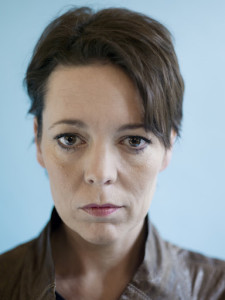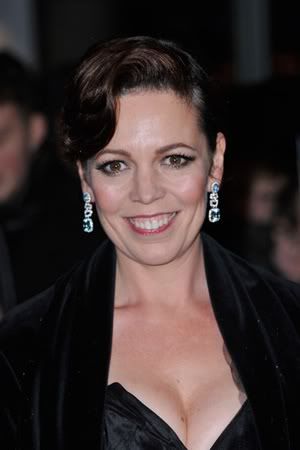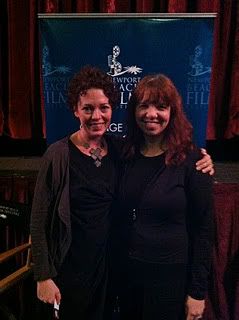 All actors love scripts like the one I received for Paddy Considine’s 2011 film Tyrannosaur. It was complete – it contained everything I needed to know about my character and the story. It did my work for me. I just needed to turn up and say the lines. But I couldn’t. The suffering my character, Hannah, went through had a real world analogue that couldn’t be ignored.
All actors love scripts like the one I received for Paddy Considine’s 2011 film Tyrannosaur. It was complete – it contained everything I needed to know about my character and the story. It did my work for me. I just needed to turn up and say the lines. But I couldn’t. The suffering my character, Hannah, went through had a real world analogue that couldn’t be ignored.
Tyrannosaur is not an ”issues” film. It is not about domestic violence, or poverty, or alcoholism. It is the blistering, heart-rending story of two people finding each other and trying to heal themselves through love. I don’t think I will ever be prouder of any job. But it is not always possible, or responsible, to separate fact from fiction, and Hannah’s story is rooted horribly in a real-world nightmare: that of domestic violence.
I had not previously had much cause to dwell on the issue. I have never suffered domestic violence, unlike the 25% of women in the UK who at some point in their lives have. Nor have any of my close family or friends, as far as I am aware. (That caveat is necessary – a 25% incidence of domestic violence means it’s quite possible that I am wrong about what people I love have faced. It’s quite possible that some people I love, and some people you love, have not told the truth about what is happening to them behind closed doors.)
Now I had to dwell on it. The most satisfying experience of my professional career would involve me confecting the kind of suffering that millions of women, and many men, suffer in reality every day. I knew the chances were high that someone who had been through it, or was still going through it, would see the film. What duty did I owe those people, between whose lives and mine was such an extraordinary gulf? I decided that I needed, at the very least, to know something about them. They deserved that respect. So I asked Paddy to put me in touch with someone at domestic violence charity Refuge.
What I wanted to know, more than anything – what I wanted to be sure about, notwithstanding the internal truths of Paddy’s script – was that Hannah’s story was credible. The brutality, the depravity, the seeming hopelessness … was it credible? The answer I got astonished me. My contact at Refuge told me that Hannah’s experience wasn’t only credible, it was nothing compared to the suffering some women and men endured. She gave me a couple of examples – just two of the many hundreds of which she had recent experience – and I could scarcely bear to hear them. Then she offered to set up a meeting with one or two of them for me.
I am afraid I declined. I knew I would just cry, and that wouldn’t help anyone. And for what? To achieve some questionable incremental improvement in my performance? To do justice to the cause of people who weren’t having enormous fun making films? Actors have a reputation for vaingloriousness, but no…
Anyway, I’d had my moment of insight. I had knowledge, where previously I’d had just my imagination and Paddy’s brilliant script. Knowledge enabled me to turn up and say my lines. It also brought me to become a patron of a domestic violence charity.
As soon as I heard about Tender, I knew it would be a good fit for me. Tender is a little different from charities like Refuge (which, in a time of reduced funding, also need all the support we can give them, because of the brilliant, life-saving support they give to people who are currently suffering the horrors of domestic abuse). Tender operates at the other end of the time line – before abuse has occurred. Tender is involved in prevention. My cowardice, my tearfulness, means I am not the best person to have around in an environment where there is real, existing suffering. Tender operates in a world where there is not – yet – any suffering; where the stakes are just as high, but they are deferred.
I have two young boys. I hope, of course, that I and my husband, and everyone else who loves them, will give them the sort of knowledge and experience that will make them, and those around them, happy. But I am aware that I will never be able to – nor should – control everything they are exposed to, or the conclusions they draw from those experiences. Nor can I always know what they are thinking, or feeling; any parent will know how hard it can sometimes be just to get a child to tell them something about their school day.
So it is vital that children and young adults have spaces – mental and physical spaces – in which it is safe for them to explore and practice strategies for dealing with real world difficulties, and build confidence to communicate and be heard. This is what Tender offers them. It works primarily with young people and runs prevention projects, which raise awareness of the issue of violence in teenage romantic relationships. It uses drama and the arts – a world that I understand as being a safe space indeed for the exploration of ideas – to give young people the skills to identify the early warning signs of abusive relationships, so that they can avoid or leave them.
These projects are a powerful tool, and worth supporting in themselves. But Tender wants more, and I want to help them achieve it. Tender wants sex and relationship education to be made mandatory in all schools, so that all young people can learn how to negotiate healthy relationships.
As I mentioned at the beginning of this piece, 25% of women will suffer domestic violence at some time in their life. Please think about that in relation to your young daughters. Think about it in relation to your young sons. Hopefully, they have not yet become part of that 25% – or become abusers themselves. But think ahead to the next 10, 15 … 40 years. You will dearly want their lives to be wonderful over these years, but it is more likely that they will be some combination of wonderful and difficult. There will certainly be a degree of suffering. Ask yourself this: what shape will that suffering take? Will it involve domestic violence? Current statistics say there’s a good chance it will. Let’s do our best to ensure it won’t.
This article is written by British actor Olivia Colman and Ed Sinclair.
Olivia will be presenting the annual awards at Tender’s upcoming event on the 10th December. For information on how to book tickets to the event, visit their website.
Source: theguardian.co.uk – Olivia Colman: Tyrannosaur made me face the true brutality of domestic violence
 To celebrate the fact that Tyrannosaur is a) out on DVD, and b) a BAFTA-winning film, we’ve got a special prize to give away.
To celebrate the fact that Tyrannosaur is a) out on DVD, and b) a BAFTA-winning film, we’ve got a special prize to give away. How does an actor with well-established comedic chops turn in a shattering performance in one of the year’s darkest, most disturbing films? Olivia Colman says she did it in “Tyrannosaur” by doing what’s real for her character—with the help of a pitch-perfect script.
How does an actor with well-established comedic chops turn in a shattering performance in one of the year’s darkest, most disturbing films? Olivia Colman says she did it in “Tyrannosaur” by doing what’s real for her character—with the help of a pitch-perfect script. The 2011 awards season may be young, with a great many breathless winners yet to soak the stage in tears, but I’m not sure we’ll see another acceptance speech quite as humbly overwhelmed as Olivia Colman’s at the British Independent Film Awards earlier this month. Visibly trembling and sincerely astonished at having beaten a roster of nominees including Tilda Swinton, the unassuming London-based actress managed to stammer out a brief list of thank-yous before scuttling off the stage, seemingly shaking her head in disbelief at her good fortune.
The 2011 awards season may be young, with a great many breathless winners yet to soak the stage in tears, but I’m not sure we’ll see another acceptance speech quite as humbly overwhelmed as Olivia Colman’s at the British Independent Film Awards earlier this month. Visibly trembling and sincerely astonished at having beaten a roster of nominees including Tilda Swinton, the unassuming London-based actress managed to stammer out a brief list of thank-yous before scuttling off the stage, seemingly shaking her head in disbelief at her good fortune. Well, if you know Olivia Colman, you know GOOD work! The above photo was taken tonight after the film and I was so thrilled to meet and chat with her.
Well, if you know Olivia Colman, you know GOOD work! The above photo was taken tonight after the film and I was so thrilled to meet and chat with her.